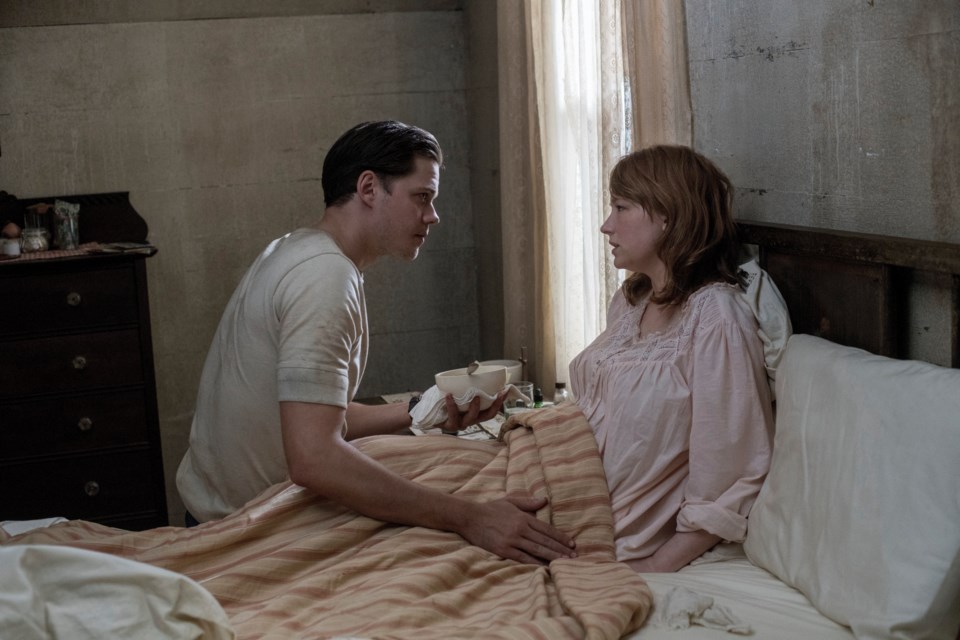Say what you will, Antonio Campos' “The Devil all the Time” lives up to its title. Spanning numerous generations and set across a bleak and blood-stained Appalachian landscape, Campos' adaptation of Donald Ray Pollock's novel weaves together narrative threads of suicide, sexual assault, cancer, crucifixion and murder by screwdriver. Cruelty runs 24/7. The devil is working overtime.
Taking place in the hills of West Virginia and southeastern Ohio, “The Devil all the Time” resides during an era that might be called, historically, a time of peace. It is anything but. Written by Campos ("Christine") and his brother Paulo Campos, with Pollock serving as narrator, the film opens with a soldier, Willard (Bill Skarsgard, terrific), just returned home from World War II. He falls in love with a beautiful young woman at a restaurant counter (Haley Bennett), scrounges together enough money for a house and has a son. Life isn't easy but it's good.
Willard is haunted by a vision from the battlefront — a crucified Marine — but his good fortune renews his faith. “I got the urge to pray again,” he writes his parents. In “The Devil all the Time,” such words take an ominous tone, as if inviting evil in. And evil most definitely comes. When Willard is out violently beating a pair of poachers that made rude remarks about his wife, she collapses at home and soon after is diagnosed with terminal cancer. In short time, the boy will sit at the backwoods altar where his father had knelt to appeal to God. By then, his mother is dead, his dog has been made a sacrifice and his father has killed himself. “It's a prayer log,” Arvin, the boy, explains to the police. “But it don’t work too good.”
Not much works too good in “The Devil all the Time.” Most signs of kindness or compassion are ruses. A couple (Riley Keough, Jason Clarke) who kindly gives hitch-hikers a ride turn out to be murderous psychopaths who strip their victims and then photograph their final moments. A
It's a grim and grotesque bunch of characters, each of them — and others — finely acted and precisely drawn. They are also an entirely white clan, an unfortunate choice that only reinforces the one-dimensionality of the film.
There's a blush of hope in the wide-eyed face of Tom Holland. He plays the orphaned Arvin grown up. Considering what the kid has been through, we’re naturally sympathetic to him. In a landscape of crooks and deviants, he's, maybe, a heroic figure of morality and vengeance.
The craft and thick Gothic atmosphere of “The Devil all the Time" is impressive. The movie has such fine-wrought texture that it holds you in its cold grasp. But it's also somewhat oppressive. Pain and suffering are all there is to the lives of “The Devil all the Time." Like another recent, professionally drawn travelogue of violence, “The Painted Bird,” there's little here beyond impressing the relentless ubiquity of evil.
There's a thread, though, on its elliptical nature. Not just in how one generation will repeat the mistakes of the one before it, but in the blood-letting horrors brought home from war. Opening with WWII, “The Devil all the Time” leads up to the beginning of the Vietnam War, and — with a strategically placed VW bus — a hint of the ‘60s. It’s too tucked away — the movie is only really devoted to its Gothic tropes. But underneath all the horror there's a deeper rumination here on where all the cruelty comes from and how it persists. Are we going “going backwards or forwards,” one character wonders. It's a good question for Campos' film, too.
"The Devil all the Time,” a Netflix release, is rated R by the Motion Picture Association of America for violence, bloody/disturbing images, sexual content, graphic nudity, and language throughout. Running time: 138 minutes. Two stars out of four.
___
Follow AP Film Writer Jake Coyle on Twitter at: http://twitter.com/jakecoyleAP
Jake Coyle, The Associated Press




